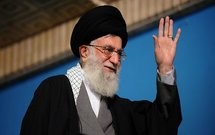 Iranian Supreme Leader Ayatollah Ali Khamenei on Thursday rejected U.S. Vice President Joe Biden's Feb. 2 offer of direct talks. Khamenei's move was prompted in part by the de-listing of two key Iranian banks from the European Union's sanctions list since Jan. 30.
Iranian Supreme Leader Ayatollah Ali Khamenei on Thursday rejected U.S. Vice President Joe Biden's Feb. 2 offer of direct talks. Khamenei's move was prompted in part by the de-listing of two key Iranian banks from the European Union's sanctions list since Jan. 30.
More de-listings of financial and commercial entities are expected, threatening to defang the sanctions campaign against Iran and giving Tehran some room to maneuver in its dealings with Washington. The move also reflected political realities at home, where infighting has escalated between Iranian President Mahmoud Ahmadinejad's camp and the one led by Khamenei. The supreme leader needs to rectify this situation if he wants to conduct negotiations with the United States from a position of relative strength.
In a speech before a gathering of air force commanders, Khamenei chastised the political forces who favor direct talks with the Americans -- President Mahmoud Ahmadinejad's camp as well as some pragmatic conservatives and reformists. Khamenei defined as naive the idea of negotiating with America, saying that negotiations will not solve any problems, and he warned that such people were aiding in efforts to re-establish American domination in the country. Despite this, however, Khamenei has not completely ruled out the possibility of talks. This is evident from his remarks addressing the United States.
In a rejoinder to Biden's comments at the Munich Security Conference last week, Khamenei accused Washington of "pointing the gun at Iran and say either negotiate or we will shoot." Khamenei went on to say that the offer of talks is meaningless unless Washington demonstrates goodwill and ends its pressure and threats.
Clearly, Khamenei is not categorically rejecting the talks. He is instead hinting that conditions need to be right before any talks can take place. Five years ago, Khamenei was much more direct. In a Jan. 3, 2008, speech to students in the central Iranian city of Yazd, Khamenei said that Tehran never said it would cut relations with the United States forever, but the conditions imposed by the United States were harmful to the interests of the Islamic republic. When the prospect of relations with the United States is beneficial to Iran, he said, he will be the first to approve of establishing them.
This raises the question: What conditions does Khamenei want imposed before going forward with direct public talks aimed at reaching a settlement with the United States? Khamenei and other Iranian officials are emphatic about demanding an attitude change in Washington toward the Islamic republic. Iran does not wish to normalize ties if that means operating within strictures determined by Washington.
Tehran wants to normalize relations with Washington essentially in the same way that China restored ties with the United States. In other words, Iran wants the United States to accept Iran as it is and not expect it to become an ally like Egypt or Turkey.
Meanwhile, Khamenei wants to ensure that domestic conditions within Iran are conducive to normalizing relations. The intra-conservative power struggle that has been raging since Ahmadinejad first took office in 2005 has steadily intensified over the years. The rift long remained a domestic matter that did not adversely affect foreign policy. The Iranians were not under that much pressure, so negotiating with the Americans was not an urgent matter. They were getting along fine working through back channels and the multilateral 5+1 Group.
The success of U.S. President Barack Obama's sanctions that cut Iranian exports in half between 2011 and 2012, coupled with the ongoing meltdown of the Syrian regime, changed Iran's outlook. This is when the push for a settlement with the United States gained momentum among the Iranian leadership, and it is when the rift among politicians in Iran began to matter in foreign policy. Khamenei realizes Iran has to deal with the United States in some way, but he is trying to buy time. Ahmadinejad's presidency is in its last few months, and the supreme leader is hoping for a much less ambitious and far more pliant individual to assume the presidency come August.
The idea is that with Ahmadinejad gone, harmony will return among the conservatives that dominate the Iranian state, allowing the supreme leader to better control the negotiating process. The European Union's de-listing of Iranian companies and the continuing stalemate in the Syrian civil war are propitious for Khamenei. He may now hold out of talks until a new president takes office, perhaps allowing Khamenei to negotiate from a position of relative strength. But the fall is quite far off. A lot can happen between now and then to throw off the Iranian supreme leader's calculations.
Courtesy : Stratfor (www.stratfor.com)